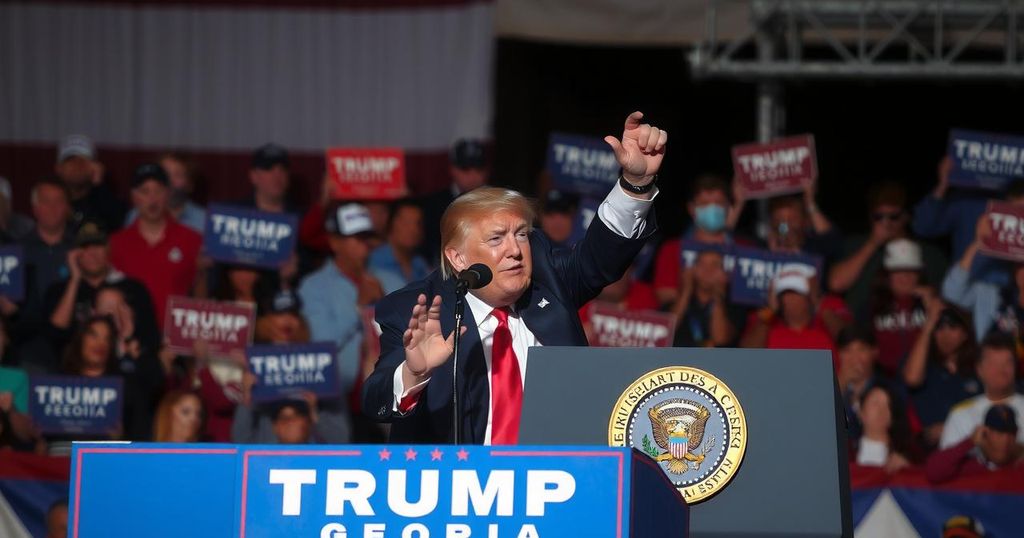Georgia’s Political Turmoil: Zourabichvili Refuses To Step Down After Kavelashvili’s Election

On December 14th, Georgian parliament elected Mikheil Kavelashvili as president amidst protests and allegations of illegitimacy from incumbent Salome Zourabichvili. Following constitutional reforms, this marks the first presidential election via an electoral college. Tensions have arisen due to Georgia’s stalled EU membership aspirations, further complicating the political landscape as protests continue.
On December 14th, the Georgian parliament elected Mikheil Kavelashvili, a former footballer and member of the ruling Georgian Dream party, as the new president of Georgia. However, incumbent President Salome Zourabichvili has adamantly refused to resign, labeling Kavelashvili’s election as “illegitimate.” This dispute has intensified anti-government protests across the nation.
This election marked a significant constitutional shift, as it was the first instance where the president was elected by an electoral college rather than through direct public vote. Following reforms in 2017, Georgia transformed from a semi-presidential to a parliamentary system, diminishing the president’s role to a largely symbolic figure. Opposition groups and protesters have claimed that electoral fraud tainted Kavelashvili’s appointment, prompting a boycott of the election process itself, where many potential candidates were deliberately excluded.
Recent protests erupted after Prime Minister Irakli Kobakhidze announced a halt to the country’s pursuit of EU membership until at least 2028. This declaration was a reaction to perceived interference by Brussels regarding internal issues, leading the Georgian Dream party to retaliate against what they deemed ideological coercion. Simultaneously, the government faced backlash over criticism from the EU concerning legislation promoting family values, which was associated with discrimination against the LGBT community.
Demonstrators voiced their dissent through symbolic gestures, such as playing football and displaying red cards in front of parliament, questioning Kavelashvili’s qualifications for the presidency, particularly citing his lack of formal education and political experience. Zourabichvili, who has played a prominent role in opposing the current government since her own election under Georgian Dream in 2018, condemned Kavelashvili’s election as “a mockery of democracy” and has called for new parliamentary elections.
The Georgian Dream government, however, has accused Zourabichvili of being influenced by Western interests, labeling her an agent of foreign powers. International observers from the Organization for Security and Cooperation in Europe (OSCE) stated they could not provide substantial evidence of electoral fraud. Kavelashvili is set to formally assume the presidency on December 29th, and protests are anticipated to persist in the interim.
Georgia has undergone significant political transformation in recent years, particularly after constitutional reforms significantly reshaped its governance structure. The transition from a semi-presidential system to a parliamentary one has altered the dynamics of power, particularly diminishing the president’s role. Additionally, the relationship between Georgia and the European Union has been fraught with controversy, especially concerning issues of human rights and governance. The political climate is further exacerbated by protests against perceived governmental mismanagement and corruption, alongside rising tensions regarding EU membership aspirations and the handling of domestic policies.
The political situation in Georgia remains unsettled following the parliamentary election that installed Mikheil Kavelashvili as president amidst allegations of electoral fraud and widespread protests initiated by his predecessor, Salome Zourabichvili. The shift to an electoral college system for presidential elections has drawn significant criticism, sparking concerns about the legitimacy of the electoral process. As Zourabichvili continues to reject the election’s validity, tensions are likely to escalate, particularly as Kavelashvili prepares to take office at the end of December.
Original Source: europeanconservative.com








